15 The Kitchen as a Classroom: Recipe to Unearth Life’s Simple Values
Addy Zenko
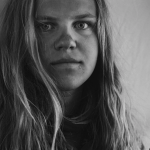 My name is Addy Zenko. I have long been intrigued by the intersection of sociopolitical matters and the environment, and during my time at Ohio State I have begun to understand that our human “environment” encapsulates far more than the natural spaces outside of our homes. This piece is a testament to that growth in understanding: it chronicles my life as an increasingly competent cook and outlines the forces that grant the kitchen its immortal power…read more.
My name is Addy Zenko. I have long been intrigued by the intersection of sociopolitical matters and the environment, and during my time at Ohio State I have begun to understand that our human “environment” encapsulates far more than the natural spaces outside of our homes. This piece is a testament to that growth in understanding: it chronicles my life as an increasingly competent cook and outlines the forces that grant the kitchen its immortal power…read more.
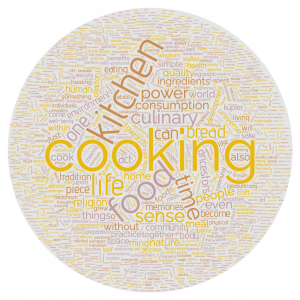
The art of cooking is a timeless practice, a ubiquitous unifier since time immemorial: in an age of limitless diversification of pressing demands, eating remains one of the few things that we all must do. This venerated act is crucial for cultural continuance and deep spiritual exploration for people all over the world, a practice whose rich appeal and infinite adaptability esteem it a craft for all to enjoy. The delicious epitome of self-care, deliberate preparation of whole ingredients is the antidote to thoughtless consumption of mass-produced, ultra-processed foods, whose impersonality and generally unhealthy nature worsen physical and mental well-being (Lin et al., 2018). The benefits of spending quality time in the kitchen, alone or with others, permeate myriad aspects of life: by choosing to cook, one is “unplugging to plug back in” by engaging with a simple, mindful practice to restore personal and familial health, build connections and instill a strong sense of community, preserve ethnic heritage, challenge a growing dependency on corporations, and fix our broken food system.
Cooking and I have a checkered past. I grew up in a household that placed a high emphasis on family and a low emphasis on cooking: having habitually consumed their products for two decades, I feel personally acquainted with the Stouffer family. Many a night was spent congregated together in the kitchen, our four pairs of wanting eyes glued to the oven, incessantly inspecting the status of our thawing French bread pizzas. Both of my parents worked full-time, neither with spare hours to sacrifice to the supermarket, meticulously gathering an arsenal of quality ingredients to fortify our pantry’s provisions. Even so, I still reaped the socio-emotional rewards of messing about in the kitchen together, proudly proclaiming well-earned test scores and soccer successes over bites of still-cold lasagna and microwaved turkey sandwiches. While I swear by the immortal words of Ratatouille’s Chef Gusteau – “anyone can cook” – I long believed my culinarily challenged parents to be the sole exception to this rule. Luckily, my big brother soon became the big cheese in the kitchen. Capable of producing wood-fired pizzas that mirror the quality of an arthritic Neapolitan nonno, my brother Matthew somehow possesses an innate cooking ability that certifies him an ace practitioner of the craft. A living luminary, Matthew and his culinary obsession piqued my curiosity as we learned to fend for ourselves in our austere home kitchen.
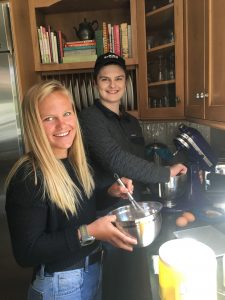
My curiosity metamorphosed into passion when I lived alone during my sophomore year of college. The liminal nature of pre-vaccine COVID society lent itself to ample confusion, boredom, and fear, which I found myself quelling in the kitchen. A cherished sense of camaraderie arose by cooking with friends, reincarnating soon-to-be-expired ingredients from the back of my refrigerator into lip-smacking concoctions: it grew to become a staple pastime amongst my otherwise house-bound friend group. Memories of oiled fingers collectively massaging Trader Joe’s premade dough and the pungency of Korean gochujang perfuming my studio apartment come to mind as I recall last fall: it was a beautiful and needed distraction from the pandemic’s shackles that bound us to an otherwise detached, chronically online lifestyle. The depth of my friendships grew immensely alongside the development of our mutual fascination with cooking. Stirring conversations about the universe shared over a bowl of pesto pasta, chocolate-scented giggles between nibbles of molten cookies, even reconciliation with an ex-boyfriend atop a steaming wok of chicken stir fry all were made possible through the magic of the kitchen.
There exists a common misunderstanding that one must be a master chef to properly cook a meal, possessing skills to craft Baked Alaska of Michelin-star quality and perfect Beef Wellingtons that could make Gordon Ramsay sing. This high perceived barrier to entry often inhibits newcomers from trying their hand at preparing simple, nourishing dishes. As author and Columbus native Daniel H. Pink notes in his book Drive (2011), “mastery is an asymptote” – even if we log ten thousand hours in the kitchen a la Malcolm Gladwell, achieving total mastery is impossible because there will always be more culinary niches to explore, more techniques to unearth, more wisdom to be gleaned from new mentors. No one has ever been or will ever be a perfect cook (though Guy Fieri has surely come close, his abdominous midsection a triumphant reminder of his ten-thousand-hour feat). However, displaying enough compassion to grant yourself permission to be a beginner, to surrender to the unknown of the culinary universe, is already a critical step towards realizing its therapeutic power.
Cooking is a vehicle for the healing of self by its inherent illumination of the not-self. In Buddhism, dukkha, translated as “suffering,” is understood in the religion “in the broadest sense: dissatisfaction, discontent, anxiety – basically our manifest inability to be happy” (Loy, 2011). For the healthy and financially stable, modern civilization is crowded with harrowing stressors often used to “excuse” us from cooking: work-related worries, racing thoughts, a perceived lack of time, or behaving obsequiously towards others’ needs while neglecting our own. The religion posits the end of dukkha as experiencing anatta, or “not self,” which is the recognition of interdependence between all beings. Flow within the kitchen is both continuous and impermanent as ingredients, spices, and aromas all dance together with us in indivisible unison. When we become fully present in the kitchen, we awaken to our innate oneness with food, thoughtfully infusing the essence of our soul into our recipes with each twirl of a wooden spoon, each flit of a knife, each sprinkle of an herb. Like snowflakes and fingerprints, no two recipes will ever be perfectly identical: cooking is an irreplicable form of art and display of love teeming with beauty and life. Our food does not exist upon one plate in the entire universe, rather it represents the entire universe on a single plate. As Vietnamese monk and Zen master Thich Nhat Hanh writes:
The Earth and the sky have collaborated to bring this spoonful of food to you… With just a little bit of mindfulness, you can truly see where your bread comes from. It has not come from nothing. Bread comes from the wheat fields, from hard work, and from the baker, the supplier, and the seller. But the bread is more than that. The wheat field needs clouds and sunshine. So in this slice of bread there is sunshine, there is cloud, there is the labor of the farmer, the joy of having flour, and the skill of the baker and then – miraculously! – there is the bread. The whole cosmos has come together so that this piece of bread can be in your hand. When you chew it mindfully, without thinking, you can see very well all that the piece of bread contains. That is why when you take a bite of the bread and chew mindfully, you are truly in communion with all of life. (2014)
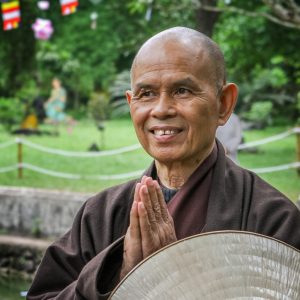
By revealing anatta and eliminating the delusion of individuality, cooking becomes a vehicle for the reconstruction of both a sense of self and of community. Exacerbated by COVID-19, contemporary isolation is a detriment to our primal desire for membership in something greater than ourselves: “our deepest dukkha is that we feel disconnected from the rest of the world” (Loy, 2011). That disconnection can be deconstructed by exercising moral virtue towards other beings: endless versatility is embedded within the act of cooking, its communal nature welcoming unbounded generosity and kindness from all who partake. Creating a space for sharing accelerates the construction of intimate social bonds, enhancing feelings of contentment and collective well-being. The range of demanding duties during communal meal preparation invite beginners to dive in headfirst, procuring new skills exhibited by the group’s seasoned veterans. Lessons, both concrete and abstract, are rife in a crowded kitchen: every participant will always learn something new. The sanctity of a community is upheld by the security of its least connected member, and communal cooking and eating fosters a distinctive sense of inclusion by the unrivaled power of its inherent selflessness.
The magic of sharing a meal is revered by countless religions across the globe, each enjoying its own nuanced twist on the sacred practice. Some scholars even speculate that religion’s imminent conception was catalyzed by cooking when our sub-human Homo erectus ancestors harnessed the power of fire nearly two million years ago in modern-day South Africa. Chewing and digesting cooked food comparatively demand minimal energy expenditure while also offering more efficient nutrient absorption from its newly increased surface area (Welsh, 2011). True for both fibrous plant matter and tough animal flesh, this improvement in caloric availability caused our ancestors to develop shorter teeth and a smaller gut, liberating them from the sizable digestive apparatus required to handle the structure of low-carbohydrate plant foods like tubers (Wong and Wrangham, 2013). This evolutionary milestone also sparked a whopping tenfold decrease in the species’ time spent actively chewing, truncating mealtimes and allocating more calories to grow the brain due to consumption of higher-quality food and improved neuron support. As Harvard anthropologist Dr. Richard Wrangham (2013) notes, “it was only after cooking enabled individuals to save time on chewing that they could increase the amount of time spent on an activity that, for all its potential benefits, might not yield any food.” This generated optimal conditions to innovate, fashioning seminal tools out of bone and responding to the novel formation of abstract thoughts, contributing to the development of art, language, religion, culture, and society (Nixon, 2008). Cooking is a developmental kingpin that helped elevate sub-human life to its now commanding status: without cooking, perhaps my words would not appear on this page today.[1]
In addition to its significance in the genesis of our species, cooking is also a channel for cultural continuance. Many culinary techniques, particularly ethnic ones, are heirlooms by nature, their intergenerational dissemination a rite of passage bound to a cosmic body of time-honored wisdom. Enrobed in tradition, ethnic cooking bestows upon neophytes a taste of their lineage, indulging in flavors and fragrances unchanged from the palate of their ancestors. Elizabeth Pérez’s book and the inspiration for this piece entitled Religion in the Kitchen: Cooking, Talking, and the Making of Black Atlantic Tradition chronicles the creation and evolution of “lived religion” in Caribbean kitchens and explains how this informal socialization, spearheaded by women and gay men, is the lifeblood for the traditions’ self-sustainment. Gestures such as the tasting of honey before it can be offered to the Afro-Cuban deity Ochún “instill the attitudes that turn participants into practitioners…to learn to fix the gods’ favorite dishes is to be ‘seasoned’ into their service” (NYU Press, 2016). These “seemingly trivial ‘micro-practices’” are “complex rituals in their own right” that supply undying endurance to these hallowed ways of life, persisting as the paragon of conscious consumption.
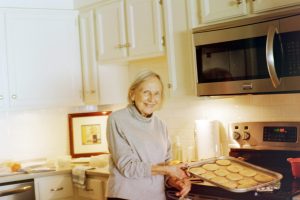
Another more common micro-practice of lived religion is the act of praying or saying grace before eating a meal. This serves as a “speedbump in our hectic lives…slowing our parades of self-sufficiency” (Raymond, 2020) and is not reserved for the devout. Such a simple act is a deliberate recalibration of the mind, interrupting the unrelenting tedium of daily life and guiding us towards a space of what Pope Francis calls “serene attentiveness” (2015). Thich Nhat Hanh (2014) considers this pause before mealtime an active cessation of “Radio NST: Non-Stop Thinking,” thus creating a time to stop the constant internal dialogue and cultivate a shared mindset of gratitude and pleasure; “in the process, people usually recognize that the source of that goodness lies at least partially outside themselves. As a result, being grateful also helps people connect to something larger than themselves as individuals — whether to other people, nature, or a higher power” (Harvard Medical School, 2021). Such a connection, Pope Francis believes, can help us “overcome [the] unhealthy anxiety which makes us superficial, aggressive, and compulsive consumers.”
Industrial food preparation, including restaurant-ready fast food and processed store-bought meals, is the antithesis of conscious consumption. It eradicates food’s sacred sense of ceremony and intensifies feelings of isolation while fattening both our bodies and the gilded pockets of smarmy CEOs. Mainstream foods boasting an impossibly long shelf life were brilliantly conceived to feed the military during World War II when soldiers needed quick, easy meals, their success influencing their rapid and prolonged invasion of grocery stores worldwide. Warm homemade meals relinquished their kitchen table stronghold to high-fat, high-sugar wartime compounds, thick with preservatives and artificial flavors pejorative to human health and development. The goal of this food is not to nourish, but to sell more product – food has thus devolved from a treasured tradition to wartime expediency into a capitalistic commodity, a transition which now manifests in the design of the modern American kitchen. Seldom home to a central gathering place, the former heart of the household has become a transitional space where kitchen-goers gawk at the insufficient contents of their cabinets or absentmindedly linger during the reheating of forlorn frozen foods shrouded in plastic. Author and subject matter expert Michael Pollan (2013) notes that even basic appliances have become a culinary centrifuge: pulling people away from the core vitality of a shared hot meal, microwaves are the epitome of individualistic eating, amplifying the illusion of time poverty by its limited capability to warm just one item during each cycle.
The principle of egoistic hedonism aptly describes the phenomenon of this disheartening transition to solitary consumption. Defined by Joseph Kupfer (1999) as shallow, self-centered pleasure seeking and the “perennial rival to moral life,” egoistic hedonism contextualizes the myopic thought process leading individuals to chase the fleeting spikes of pseudo-satisfaction provided by mass-produced food, among other things. Much like their ingredients’ effect on the body, these transient pleasure spikes precede a crash, both physical and moral; Socrates paralleled such cyclical discontent with an attempt to fill a leaky vessel, as “no sooner are an individual’s desires satisfied than they require replenishment” (Kupfer, 1999). According to Aristotle, engagement in virtuous activity is the cure to egoistic hedonism which leads to achievement of eudaimonia, a Greek word referring to human flourishing from achievement of the “golden mean” of moderation (Kupfer, 1999). Cooking helps us slow down, deepen our capacities for artistic and culinary appreciation, develop and refine meaningful talents, and do things solely for the sake of doing them. This rejection of grim uniformity and short-sighted temptation exhumes the self-sustaining goodness of life: health, knowledge, beauty, justice, and love.
Outpacing the convenience of incessant consumption of quick food, the physical, mental, and spiritual benefits of home cooking are backed by airtight science. Waltzing atop the stove and curling into awaiting nostrils, the fragrances of sapid concoctions can stir up fond memories with an almost disturbing clarity at the mercy of the body’s olfactory system. Sorry, Voldemort, but the more than one thousand nasal receptors afford humans’ sense of smell an iron-clad link to memory and emotion, stronger than any other sense. Sensory information from the other four senses – hearing, sight, taste, and touch – is processed through the thalamus, which serves as a relay station to other relevant brain areas, whereas smells bypass the thalamus entirely to infiltrate their own section of the brain called the olfactory bulb. This region is solely responsible for odor reception and is directly connected to the amygdala and hippocampus, which control emotional perception and regulation as well as long-term memory storage – the olfactory bulb can even preserve odor-related memories in-house within its piriform cortex (Hamer, 2019). Offering nostalgic joy to all, this facet of cooking is especially helpful for those struggling with dementia. Despite a dwindling ability to complete mundane tasks in the same capacity, cooking’s ignition of the olfactory system and triggering of associated memories allows the cognitively impaired to perform this stimulating task with dignity, breathing in redolent memories of their sweet, muddied past.
Delicious, nutritious food is merely a byproduct of the fruitful lessons of the kitchen, revealing remarkable, timeless metaphors for this ephemeral life. Cooking teaches us the lessons outlined by Richard Baer (1976), that things exist “not just for the sake of control but also for enjoyment,” and that there lies great value in doing things without motive. It perfectly balances the juxtaposition of what philosopher Josef Pieper distinguished between understanding as both ratio – “the power of discursive, logical thought, of searching and examination, of abstraction, of definition and drawing conclusions” – and intellectus – “the power of direct intuition […] associated with the passive receptivity of the contemplative.” There is space for both left and right brains at the table, stimulating a ratio mind with measurements of painstaking precision and an intellectus one with erratic, soulful additions of ancillary herbs and spices. The kitchen is a home for people of all stripes: it refuses to discriminate based on race, class, gender, or cognitive proclivity.
Cooking upholds the values of resilience and self-compassion, encouraging reflection upon failures from trial and error. The tapestry of culinary tradition is woven by resilient hands that overcame their mistakes, choosing to instead champion their fallibility. By exercising self-acceptance regardless of performance or outcome, it suddenly becomes easier to incorporate a cheeky, flirtatious attitude into your cooking: as a sage friend once told me, “love and cooking should be approached in the same way – with reckless abandon.”
Socrates famously asserted that an unexamined life is not worth living. Without sober reflection on how we coexist with one another – living, eating, learning, and loving – it is impossible to rectify false beliefs that undermine our well-being (Kupfer, 1999). Examining the relationship between our food and the health of ourselves, our community, and our environment is critical if we seek to banish the fallacy of our division from one another. The act of cooking is a living time capsule, an invisible thread connecting us to the resilience of our ancestors and the resplendent culinary traditions that colored their lives. Home cooking is an act of rebellion against avaricious corporate titans, a refusal to acquiesce to their destruction of life’s simple pleasures for the sake of profit. Food is community medicine: it brings about healing through gentle nourishment of the body and equanimity of the soul. How fortunate we are to have the ability to taste the world from the comfort of our own homes, each sense aroused by the invigorating rhythm and allure of the kitchen!
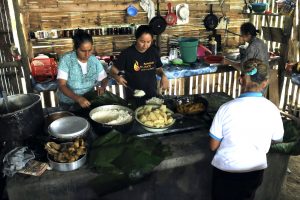
As I march on through my culinary quest, I am ceaselessly taken by the healing powers of the kitchen. Practically a panacea to all that plagues me, my life has grown richer, my body healthier, and my friendships stronger as my relationship with food blossoms without reservation. Like all other virtuous facets of life, self-improvement realized in the kitchen is constant and ever-evolving, making it all the more delicious: an absolute turducken of a pastime stuffed to the gills with tradition, creativity, and quality time. [2]Realizing the self-sustaining good of cooking provides a step towards what Aristotle describes as a eudaimonic life, desirable for its own sake — the rest is just gravy.
References
Baer, R. A. (1976). Our need to control: Implications for Environmental Education. The American Biology Teacher, 38(6), 473-476. DOI: 10.2307/4445695
Hamer, A. (2019, August 1). Here’s why smells trigger such vivid memories. Discovery. https://www.discovery.com/science/Why-Smells-Trigger-Such-Vivid- Memories
Hanh, T. N. (2014, August 1). How to Eat. Parallax Press.
Harvard Medical School. (2021, August 14). Giving thanks can make you happier. Harvard Health Publishing. https://www.health.harvard.edu/healthbeat/giving- thanks-can-make-you-happier
Kupfer, J. H. (1999). Virtue and happiness in Groundhog Day. Visions of virtue in popular film. Westview Press. ISBN-10: 0813367212
Nixon, R. (2008, August 11). Cooking and cognition: How humans got so smart. Live Science. https://www.livescience.com/2764-cooking-cognition-humans-smart.html
Lin, T. K., Teymourian, Y., & Tursini, M. S. (2018, April 14). The effect of sugar and processed food imports on the prevalence of overweight and obesity in 172 countries. Global Health, 14(35), https://doi.org/10.1186/s12992-018-0344-y
NYU Press (2016, February 26). Religion in the kitchen: Cooking, talking, and the making of Black Atlantic traditions. New York University Press. https://nyupress.org/9781479839551/religion-in-the-kitchen/
Pink, D. H. (2011). Drive: The surprising truth about what motivates us. Canongate Books.
Pollan, M. (2013, December 5). How cooking can create community. U.S. Catholic. https://uscatholic.org/articles/201312/how-cooking-can-create-community/
Pollan, M. (2018, May 15). How to change your mind: What the new science of psychedelics teaches us about consciousness, dying, addiction, depression, and transcendence. Penguin Press.
Pope Francis (2015). Laudato Si’: On care for our common home [encyclical].
University of Oxford (2017, March 16). Social eating connects communities. University of Oxford. https://www.ox.ac.uk/news/2017-03-16-social-eating-connects- communities
Welsh, J. (2011, August 22). Man entered the kitchen 1.9 million years ago. Live Science. https://www.livescience.com/15688-man-cooking-homo-erectus.html
Wrangham, R., & Wong, K. (2013, September 1). Case for (very) early cooking heats up. Scientific American. https://www.scientificamerican.com/article/case- for-very-early-cooking-heats-up/
- While influential, it is worth noting that cooking is not the only potential influence on our transformation into Homo sapiens. Other scholars, such as the late ethnobotanist Terrence McKenna, champion the theory that "psilocybes gave our hominid ancestors 'access to realms of supernatural power,' 'catalyzed the emergence of human self-reflection,' and 'brought us out of the animal mind and into the world of articulated speech and imagination' ...by giving us the gifts of language and self-reflection psilocybin mushrooms made us who we are, transforming our primate ancestors into Homo sapiens" (Pollan, 2018). ↵
- Popularized by legendary NFL coach and commentator John Madden, the turducken is an iconic three bird roast comprised of a turkey stuffed with a duck stuffed with a chicken. ↵
